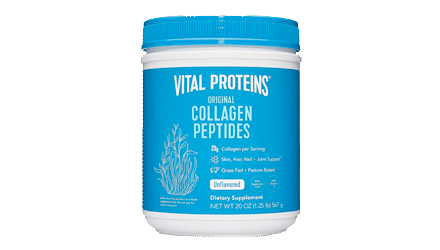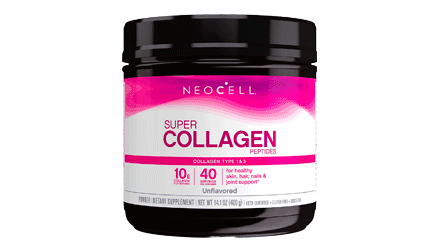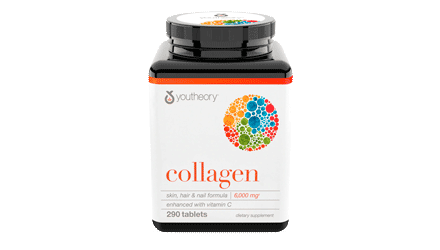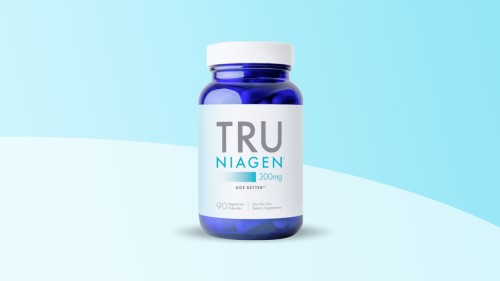The Benefits of Taking Collagen Supplements
Last Updated on June 2, 2023
Medically Reviewed by Anthony Dugarte, MD
Taking high-quality collagen supplements may offer a number of benefits for your skin, hair, nails, bones, muscles, joints, and heart — and the evidence behind them continues to grow.


Key Highlights
- Collagen is a vital protein produced naturally in our bodies that is primarily responsible for the health of our joints, bones, and skin.
- As we age, our existing collagen breaks down, and we stop producing enough collagen. The best way to support your collagen production is through a well-balanced diet.
- However, emerging research points to the potential health benefits of taking collagen supplements for your skin, hair, bones, muscles, joints, and even heart health.
- Collagen supplements may not benefit everyone, but the potential is there, and they appear to come without the risk of adverse side effects.
- The best part about collagen supplements is how easy they are to add to your daily routine. They are usually found as a tasteless and odorless powder that can be added to your morning coffee or any other beverage.
Collagen in a Snapshot
Collagen is the most abundant protein naturally found in your body, particularly in your connective tissues. (1) Some of its main roles are providing structure for your skin and strengthening your bones.
Collagen is concentrated in parts of your body that are necessary for constant physical movement, including your skin, bones, muscles, ligaments, and tendons.
There are 28 types of collagen present in our bodies. The most common ones are:
- Type I: Provides structure to bones, skin, tendons, and ligaments.
- Type II: Provides structure of cartilage, cushioning between bones, frame of the nose, and ears.
- Type III: Found in muscles, vessel walls, muscles, lung fibers, liver, and other organs
- Type V: Used in forming collagen fibers of types I and III. They are found in bones, eyes, muscles, liver, lungs, and placenta, supporting their structure.
- Type X: Used in bone and cartilage formation.
Our bodies naturally produce collagen by combining the amino acids (glycine, proline, and hydroxyproline), which are the building blocks of protein. In addition, our bodies need vitamin C, zinc, and copper to make collagen.
Why Consider a Collagen Supplement?
Our existing collagen breaks down as we age, and our bodies make less collagen. In addition, lifestyle factors such as consuming a poor diet, not using sun protection, smoking, and elevated blood sugar levels, contribute to collagen breakdown and slow regeneration.
The best way to support your collagen production is to give your body the building blocks it needs. Eating a well-balanced diet consisting of protein-rich foods, whole grains, fruits, and vegetables will provide your body with the amino acids and nutrients it needs to produce collagen.
Tip: For a more detailed dive into supporting your collagen production, read our guide here
In addition, many people are turning to collagen supplements, which have become increasingly popular. Fortunately, this trend is actually backed by a growing body of studies.
Collagen supplements typically contain type I and type III (the most abundant types found in our bodies), which are sourced from bovine (cows). Multi-collagen supplements can include up to five types sourced from cows, chickens, fish, and eggshell membranes.
All collagen supplements come in a digestible form that our bodies can use — called collagen peptides or hydrolyzed collagen. (2)
Most collagen supplements come in the form of a tasteless and odorless powder that can be added to your morning coffee or any other beverage.
Possible Benefits of Collagen Supplements
Taking a high-quality collagen supplement may offer various benefits for your skin, bones, muscles, joints, and heart — and the evidence behind them continues to grow. We explore some of the research below so you can understand what these supplements can and can’t provide.
Joint Pain
Joint discomfort is a common complaint among aging individuals and highly active people. Much of this results from the deterioration of collagen around your joints, which cushions and protects them. Additionally, conditions like osteoarthritis are more common with age and can cause chronic joint pain and inflammation.
Collagen supplements have been shown to help reduce joint pain for some people, including those experiencing osteoarthritis. They may have an anti-inflammatory effect that is helpful for pain management. (3, 4, 5)
Additionally, studies have shown that 2 grams of collagen daily helped significantly improve joint pain symptoms and increase the ability to be physically active. Other studies show the same improvements for athletes. (6, 7)
Skin Health and Appearance
Because it’s a major component of your skin, age-related reduction in collagen can become evident in your outward appearance. Specifically, many people experience related skin changes, including wrinkles and skin dryness, as they age. (8)
A growing body of research suggests that taking collagen supplements can improve the integrity of your skin health, resulting in reduced appearance of wrinkles, improved skin hydration, and increased elasticity. (9, 10, 11, 12)
While part of the success of supplements is likely because you’re increasing the amount of overall collagen available, they also help your body increase its own collagen production. (8)
Collagen may also boost the production of other structural proteins in your skin, like elastin and fibrin, which may also improve appearance. (8, 13)
Nail Strength
In addition to your skin, collagen is also a major structural component of your nails. Decreased collagen production with age can also lead to nails becoming more brittle.
Researchers found that collagen improved nail brittleness, increased nail growth, and significantly reduced nail breakage. (14)
Hair Strength
While research is not yet robust for collagen’s role in supporting hair health, there are several reasons why collagen may also be helpful here.
For instance, collagen contains amino acids that make up keratin, a protein your body uses to make hair. (15, 16) Additionally, collagen may help improve the integrity of skin cells that decrease with age and may contribute to thinning hair. (17, 18)
Heart Health
Collagen is partly responsible for arterial structure, and if it’s lacking, this could lead to weakened arteries and potentially increased susceptibility to atherosclerosis (a condition where plaque builds up inside arteries). (1)
Studies have shown that participants taking 16 grams of collagen daily for 6 months saw a significant improvement in artery stiffness and a 6% increase in HDL (the “good” cholesterol), which is protective of heart health. (19)
Muscle Mass
While less concentrated than in your skin, collagen is also found in your muscles and plays a role in their strength and functioning. (20)
Some research suggests that taking collagen may stimulate creatine production, a muscle protein, and promote muscle building post-exercise. Specifically, one study showed elderly men with sarcopenia (common age-related muscle loss) experienced a significantly higher increase in muscle mass and strength than those who also exercised but did not take collagen. (21)
Bone Strength
Collagen is a significant component of your bones and a factor in their strength. Bone mass can naturally decrease with age, resulting in conditions such as osteoporosis or porous and fragile bones. (22) (23)
Research has found that collagen supplementation can increase bone mineral density, which reduces the risk of weakened bones and osteoporosis. (24, 25)
Additionally, other studies show that women who took a calcium supplement combined with 5 grams of collagen for 12 months had fewer proteins in their blood that contribute to bone loss than women who took calcium alone. (26)
Are Collagen Supplements Safe?
Taking collagen supplements appears to be generally low-risk. A 2019 literature review of collagen supplements for the skin stated that its use has no reported adverse effects. (27)
However, because collagen supplements may be derived from fish, bovine, or chicken, they shouldn’t be used if you have an allergy to them or are following a vegan diet. According to the U.S. National Library of Medicine, taking collagen derived specifically from shark cartilage may cause high blood calcium levels. (28, 29)
Always speak to your doctor before taking collagen supplements, especially if you’re on medications, pregnant, breastfeeding, or have other underlying conditions.
How Soon Can I Expect Results From Taking Collagen?
It’s important to note that collagen supplementation needs to be incorporated into your routine long-term, as it takes consistency and patience to notice any results. In addition, results may vary for different people, and it depends on what specific benefit you’re trying to achieve.
The studies we reviewed on collagen's benefits showed various timeframes for noticing results. For example:
- Skin Health: Showed improvement in participants’ skin appearance and health in 8-12 weeks of daily collagen use.
- Joint Health: Studies showed improvement in joint pain relief in 1 week, while other studies on athletics showed improvement after 24 weeks.
- Nail Health: A clinical trial showed improved nail brittleness, increased nail growth, and reduced nail breakage after 24 weeks of daily collagen use. (14)
- Hair Health: Although there is not much research on how collagen directly impacts hair growth, there are indirect ways that collagen may improve thinning hair by improving skin elasticity since hair grows through the skin. As mentioned, improvements to skin health were seen in as little as 8-12 weeks. (10)
- Heart Health: According to studies, participants saw improvements in artery stiffness and a 6% increase in HDL (good cholesterol) after six months of daily collagen use.
- Muscle Mass: According to a study we reviewed, men with sarcopenia experienced a higher increase in muscle mass and strength after 12 weeks of daily collagen intake.
- Bone Strength: People experienced increased bone mineral density after 12 months of daily collagen intake. (24)
Product Recommendations
If you plan on taking a collagen supplement, it is essential to find a high-quality one. There are a few excellent collagen supplement brands out there that we are comfortable recommending based on the following reasons:
- They are third-party tested for safety and quality.
- They contain the clinically researched amount of collagen.
- The brands offer additional ingredients, such as vitamin C and hyaluronic acid, which help with collagen production, absorption, and skin elasticity.
- They are reasonably priced, provide good value, and come from trustworthy brands.
Explore the Brands
At WellnessVerge, we only use reputable sources, including peer-reviewed medical journals and well-respected academic institutions.
- Collagen: The Fibrous Proteins of the Matrix:
https://www.ncbi.nlm.nih.gov/books/NBK21582/ - Hydrolyzed Collagen-Sources and Applications:
https://pubmed.ncbi.nlm.nih.gov/31703345/ - Collagen hydrolysate for the treatment of osteoarthritis and other joint disorders: a review of the literature:
https://pubmed.ncbi.nlm.nih.gov/17076983/ - Collagen supplementation as a complementary therapy for the prevention and treatment of osteoporosis and osteoarthritis: a systematic review:
http://www.scielo.br/pdf/rbgg/v19n1/1809-9823-rbgg-19-01-00153.pdf - Efficacy and tolerability of an undenatured type II collagen supplement in modulating knee osteoarthritis symptoms: a multicenter randomized, double-blind, placebo-controlled study:
https://pubmed.ncbi.nlm.nih.gov/26822714/ - Effect of the novel low molecular weight hydrolyzed chicken sternal cartilage extract, BioCell Collagen, on improving osteoarthritis-related symptoms: a randomized, double-blind, placebo-controlled trial:
https://pubmed.ncbi.nlm.nih.gov/22486722/ - 24-Week study on the use of collagen hydrolysate as a dietary supplement in athletes with activity-related joint pain:
https://pubmed.ncbi.nlm.nih.gov/18416885/ - Skin anti-aging strategies:
https://www.ncbi.nlm.nih.gov/pmc/articles/PMC3583892/ - Oral intake of specific bioactive collagen peptides reduces skin wrinkles and increases dermal matrix synthesis:
https://pubmed.ncbi.nlm.nih.gov/24401291/ - Daily consumption of the collagen supplement Pure Gold Collagen® reduces visible signs of aging:
https://www.ncbi.nlm.nih.gov/pmc/articles/PMC4206255/ - Effects of a nutritional supplement containing collagen peptides on skin elasticity, hydration and wrinkles:
https://www.jmnn.org/article.asp?issn=2278-1870;year=2015;volume=4;issue=1;spage=47;epage=53;aulast=Borumand - Oral supplementation of specific collagen peptides has beneficial effects on human skin physiology: a double-blind, placebo-controlled study:
https://pubmed.ncbi.nlm.nih.gov/23949208/ - Oral Intake of Specific Bioactive Collagen Peptides Reduces Skin Wrinkles and Increases Dermal Matrix Synthesis:
https://www.researchgate.net/publication/259628887_Oral_Intake_of_Specific_Bioactive_Collagen_Peptides_Reduces_Skin_Wrinkles_and_Increases_Dermal_Matrix_Synthesis - Oral supplementation with specific bioactive collagen peptides improves nail growth and reduces symptoms of brittle nails:
https://pubmed.ncbi.nlm.nih.gov/28786550/ - Keratin: Structure, mechanical properties, occurrence in biological organisms, and efforts at bioinspiration:
https://www.sciencedirect.com/science/article/abs/pii/S0079642515000596 - The structure of people’s hair:
https://www.ncbi.nlm.nih.gov/pmc/articles/PMC4201279/ - Hair follicle dermal stem cells regenerate the dermal sheath, repopulate the dermal papilla, and modulate hair type:
https://pubmed.ncbi.nlm.nih.gov/25465495/ - Decreased Collagen Production in Chronologically Aged Skin:
https://www.ncbi.nlm.nih.gov/pmc/articles/PMC1606623/ - Effect of Collagen Tripeptide on Atherosclerosis in Healthy Humans:
https://www.ncbi.nlm.nih.gov/pmc/articles/PMC5429168/ - Structure and Function of the Skeletal Muscle Extracellular Matrix:
https://www.ncbi.nlm.nih.gov/pmc/articles/PMC3177172/ - Collagen peptide supplementation in combination with resistance training improves body composition and increases muscle strength in elderly sarcopenic men: a randomised controlled trial:
https://www.ncbi.nlm.nih.gov/pmc/articles/PMC4594048/ - The role of collagen in bone strength:
https://pubmed.ncbi.nlm.nih.gov/16341622/ - The Pathophysiology and Treatment of Osteoporosis:
https://pubmed.ncbi.nlm.nih.gov/26163201/ - Specific Collagen Peptides Improve Bone Mineral Density and Bone Markers in Postmenopausal Women—A Randomized Controlled Study:
https://www.ncbi.nlm.nih.gov/pmc/articles/PMC5793325/ - Is bone mineral density predictive of fracture risk reduction?:
https://pubmed.ncbi.nlm.nih.gov/15025843/ - A calcium-collagen chelate dietary supplement attenuates bone loss in postmenopausal women with osteopenia: a randomized controlled trial:
https://pubmed.ncbi.nlm.nih.gov/25314004/ - Oral Collagen Supplementation: A Systematic Review of Dermatological Applications:
https://pubmed.ncbi.nlm.nih.gov/30681787/ - Shark Cartilage:
https://medlineplus.gov/druginfo/natural/909.html#DrugInteractions - Allergy to fish collagen: Thermostability of collagen and IgE reactivity of patients' sera with extracts of 11 species of bony and cartilaginous fish:
https://www.sciencedirect.com/science/article/pii/S1323893016300491









